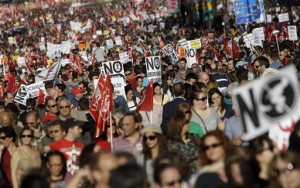
Thousands of people protest against recent labour reform in Madrid, Spain, Thursday, March 29, 2012, during a general strike day. Spanish unions angry over economic reforms are waging a general strike, challenging a conservative government not yet 100 days old and joining other troubled European workers in venting their frustration on the street. AP PHOTO/ALBERTO DI LOLLI
MADRID—Spaniards staged a general strike and took to the streets Thursday in anger at labor reforms, spending cuts and soaring unemployment, prompting scuffles with police.
Police charged and arrested hooded rioters and bins were set on fire in Barcelona while there were some face-offs in Madrid, although most demonstrations passed off peacefully.
Thousands of workers under union banners picketed businesses and transport hubs, while other groups staged bicycle rallies, slowing traffic, as police deployed in large numbers.
“No turning back… General strike!” protestors yelled, wearing stickers that read: “No to the labor reform of cheap lay-offs.”
It was the first national strike to challenge Prime Minister Mariano Rajoy, who was sworn in 100 days ago vowing to cut Spain’s 23-percent unemployment rate and fix its faltering finances.
Ministers on Friday adopt a 2012 budget set to axe tens of billions of euros in spending, adding to cuts that have already squeezed public services.
Rajoy has warned the budget will be “very austere.”
Candido Mendez, leader of the UGT union, told reporters Friday’s budget would be “unfair, useless in the fight against the economic crisis, and could become a battering ram to increase the destruction of employment.”
Spain’s major CCOO and UGT unions called the strike over the right-leaning government’s February 11 labor reform, which makes it cheaper to lay off staff and easier to cut salaries.
They planned protests in 100 towns and cities.
Minimum service agreements kept schools and hospitals open, ensuring 30 percent of trains and buses ran, and allowed some planes to fly despite Iberia, Air Nostrum and Vueling canceling two-thirds of flights.
Unions claimed a big turnout especially in factories, but interior ministry policy chief Cristina Diaz said fewer people took part than in the last general strike in September 2010.
Two leading business associations, CEOE and CPYME, said in a statement that most companies were operating normally.
Police arrested 58 people in the early morning at a blockade at a bus station in Madrid, while six police and three strikers were slightly injured in minor incidents, the interior ministry said.
One policeman hit a protester with his baton, cutting him above the eyebrow as he and others tried to stop buses leaving a station in southern Madrid, an AFP photographer said.
In Barcelona police said 30 people were arrested.
At a union rally in central Madrid, 56-year-old civil service worker Angel Escolar said the labor reform removed basic workers’ rights.
“They can change your hours, change your shifts, cut your salary and lay off people without justifying it. They are going to throw us out and hire young people for less and with worse conditions,” he said.
Many commuters still crowded train stations and bus stops, saying they could not afford to lose a day’s pay.
“I can understand why they strike. The reform is just to fire people more easily and more cheaply,” said underground commuter Pedro Moreno, 32, who works at a supermarket.
“But this is not the time to lose work days. I am lucky to have a job,” he added.
“I am not going to strike because that would mean cooperating with the crisis and losing millions of euros that we need to get out of it,” said Carmen Sanchez, 45, a civil servant waiting at Madrid’s Atocha train station.
The strike came at a bad time for Rajoy, who is trying to show Europe that Spain will fulfill its promises to cut spending and trim the public deficit to 5.3 percent of economic output this year from 8.51 percent last year.
The government has already announced budget cuts and tax hikes totalling 15 billion euros but analysts say Spain needs to shave a total 50 billion euros from the budget.
Further mass demonstrations were planned on Thursday evening.
CCOO general secretary Ignacio Fernandez Toxo warned of a new show of force on May 1.
“If they don’t go back on the reform there will be a growing social conflict until they fix it,” he said.